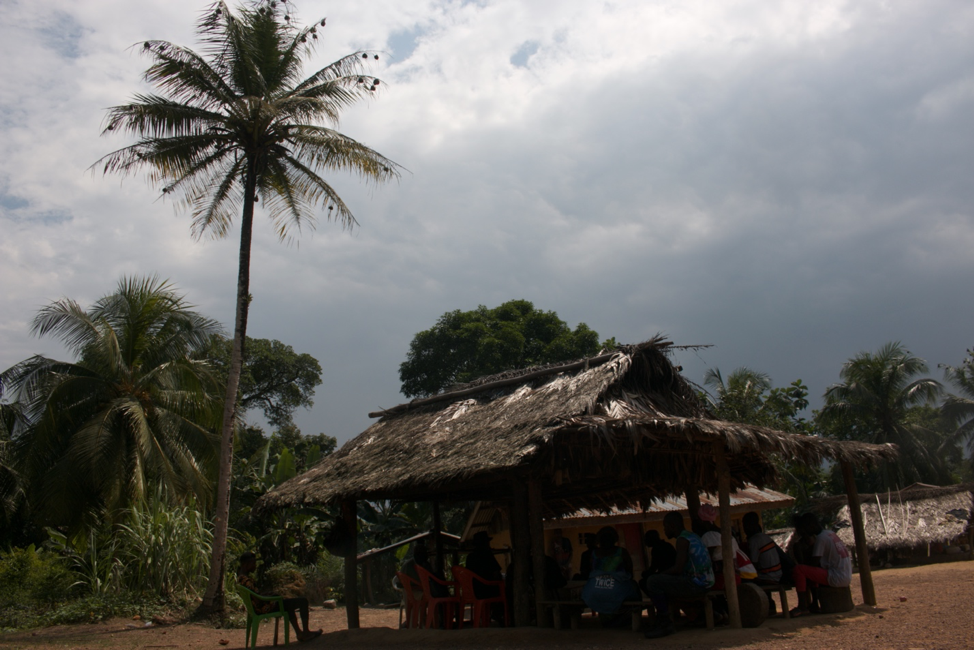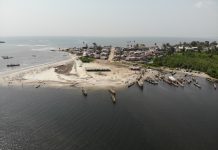Top: An Equatorial Palm Oil truck transports palm nuts at the company’s Palm Bay estate. The DayLight/James Harding Giahyue
By Emmanuel Sherman
JOGBAHN CLAN, Grand Bassa County – last year, there were hopes after farmers and Equatorial Palm Oil (EPO) began negotiation to resolve a conflict between the pair over a controversial deal that saw the company pay for their crops.
But that negotiation has failed and the farmers have told The DayLight they would file a complaint against EPO with the Roundtable on Sustainable Palm Oil (RSPO), the global watchdog for the commodity if they do not get redress.
“The proposals from the communities were all denied by the company,” says James Otto of the Sustainable Development Institute (SDI), an NGO working with the villagers, in an interview with The DayLight.
The RSPO’s principles and criteria call for its member companies to respect communities’ free, prior and informed consent (FPIC) before planting palm trees on lands they occupy.
“The communities think that these processes were not followed after the company made a series of unrealistic promises to them,” adds Otto.
The farmers say they are seeking the intervention of local and county authorities on the matter, a prerequisite for lodging complaints with the global certification scheme.
“If nothing is done, we will go to RSPO,” says Luke Paye Toe, the chairman of the aggrieved farmers.
The conflict started in 2016 when EPO compensated farmers from five communities: Gmene, Kampala, Wesseh Village, Paye Town, and Morb Town. EPO and the Liberian government had signed a 50-year agreement in 2008 for the company to expand its plantation to cover 169, 000 hectares in Grand Bassa, River Cess, and Sinoe counties. It was a transfer and extension of a 1965 agreement between the country and LIBINCO, whose plantations were destroyed during the Liberian Civil War. EPO had to pay the farmers for their crops before clearing them to replant palm trees.
But the farmers allege they were cheated in the deal. They accuse EPO of using previous government-approved prices that were higher to seal the deal but paid them according to new prices that were low.
The previous one, for instance, had rubber at US$97.92 for a mature tree—the villagers are predominant rubber farmers—but that was reduced to just US$6. The change also affected other crops, including sugarcane from US$0.54 a stick to US$6 an acre, and banana from US$1.69 to US$3 for several shrubs.
The government had lowered the compensation of the crops to “spur development,” a June 6, 2014 public notice released by the Ministry of Agriculture said.
“This action has been taken in furtherance of the Agenda for Transformation for the effective development of the agriculture sector with reference to the Millennium Development Goals and pushing the post-2015 development agenda,” it added.
The farmers had anticipated US$2 million for rubber alone but received US$224,597 for all their crops in the end. They demand a balance of over US$1.7 million or a negotiated settlement.
“They are not willing to pay us,” says Hillary Gbah of Gmene Town, who received US$14,574, according to records of the payment seen by The DayLight, but expected to get US$237,847. “We will take them to task.”
EPO denies any wrongdoing, saying they compensated the farmers according to the government-set prices. “It is their decision to go to the RSPO,” says Jasvinder Singh, EPO’s compliance manager.

The farmers have written the National Bureau of Concessions (NBC), Gbehzohngar Findley, former President Pro Tempore of the Liberian Senate, and county officials on the matter.
“We the five communities… wish to formally bring to your attention our hurts and betrayal on the part of EPO to deliver our just and fair benefits, regarding the use of our land,” their letter to the Grand Bassa Legislative Caucus reads.
“We the farmers and community members of the five… communities are complaining the company to you and hope that you will take the needed actions in addressing our concerns,” it adds.
EPO is a member of the RSPO through its parent company Kuala Lumpur Kepong Berhad (KLK) of Malaysia, one of the oldest and largest multinational palm oil companies in the world. Not being in compliance with the watchdog’s standards could hurt its standing on the Alternative Investment Market (AIM) of the London Stock Exchange (LSE), where it is listed.
It would not be the first complaint involving EPO at the RSPO. In 2013, other towns in Jogbahn Clan filed a complaint against it for an alleged land grab but the watchdog cleared the company of that accusation. Ironically, the five communities in the current controversy did not have issues with the company and did not participate in the 2013 complaint.
“The new planting of 1,570 hectares is not in the disputed area claimed by the Joghban Clan,” the RSPO said at the time. However, it mandated EPO to stop development in disputed areas and address its encroachment into Nnuhn and Qwrakpojilain villages. Afterward, the communities and the clan participated in demarcating their boundaries and the dispute was resolved.
Funding for this story was provided by the Green Livelihood Alliance (GLA 2.0) through the Community Rights and Corporate Governance Program of the Sustainable Development Institute. The DayLight maintained complete editorial independence over the story’s content.





Facebook Comments